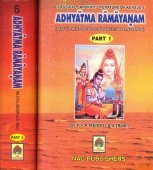Arth: 7 definitions
Introduction:
Arth means something in Hinduism, Sanskrit, Hindi. If you want to know the exact meaning, history, etymology or English translation of this term then check out the descriptions on this page. Add your comment or reference to a book if you want to contribute to this summary article.
Languages of India and abroad
Sanskrit dictionary
Source: DDSA: The practical Sanskrit-English dictionaryArth (अर्थ्).—1 A. अर्थयते (arthayate), epic अर्थते (arthate); अर्थयांचके, अर्थयिष्यते, आतर्थत, अर्थयितुम्, अर्थित (arthayāṃcake, arthayiṣyate, ātarthata, arthayitum, arthita)]
1) To request, beg, supplicate, ask, entreat, solicit (with two acc.); त्वामिममर्थमर्थयते (tvāmimamarthamarthayate) Daśakumāracarita 71; तमभिक्रम्य सर्वेऽद्य वयं चार्थामहे वसु (tamabhikramya sarve'dya vayaṃ cārthāmahe vasu) Mb.; प्रहस्तमर्थयांचक्रे योद्धुम् (prahastamarthayāṃcakre yoddhum) Bhaṭṭikāvya 14.88.
2) To strive to obtain, desire, wish.
Source: Cologne Digital Sanskrit Dictionaries: Shabda-Sagara Sanskrit-English DictionaryArth (अर्थ्).—[artha] r. 10th el. (arthayate sometimes -ti) To ask or beg.
Source: Cologne Digital Sanskrit Dictionaries: Benfey Sanskrit-English DictionaryArth (अर्थ्).—i. 10 (rather a denom. derived from artha) [Ātmanepada.] To ask, to request; with two acc. [Daśakumāracarita] in
— With the prep. abhi abhi, To ask, to request, [Prabodhacandrodaya, (ed. Brockhaus.)] 109, 18, with two acc; [Parasmaipada.], with acc. and loc. [Kathāsaritsāgara, (ed. Brockhaus.)] 26, 148. tvām bhartṛtve 'bhy arthayiṣyati, She will ask thee to become her husband. abhyarthita, Asked, [Mānavadharmaśāstra] 2, 189. n. Desire, [Yājñavalkya, (ed. Stenzler.)] 2, 88.
— With kad kad. 1. To treat ill, Böhtl. Ind Spr. 591. 2. To reproach, [Daśakumāracarita] in
— With pra pra, To request, [Pañcatantra] 255, 22; prārthayāna instead of prārthayamāna, [Rāmāyaṇa] 2, 25, 31; with inf. kim idaṃ prārthitaṃ kartum, What is this which you intend to do? [Nala] 19, 15; [Parasmaipada.] [Rāmāyaṇa] 3, 40, 6; [Pañcatantra] 96, 5. tatprārthita, i. e. tad-, adj. Requested by him, [Daśakumāracarita] in
— Pass. prārthya, To be desired, ib. 184, 17.
— With abhipra abhi-pra, To wish, [Rāmāyaṇa] 2, 11, 3.
— With saṃpra sam -pra, To request, Mahābhārata 5, 18.
— With prati prati, To challenge, [Bhaṭṭikāvya, (ed. Calc.)] 6, 25.
— With sam sam (rather a denom. derived from samartha), 1. To prepare, [Rāmāyaṇa] 4, 26, 25 ([Parasmaipada.]);
Arth (अर्थ्):—[class] 10. [Ātmanepada] arthayate (2. [dual number] arthayāse, [Ṛg-veda x, 106, 7]; [subjunctive] 2. sg. arthayāse, [Ṛg-veda i, 82, s]);
— rarely [class] 1. [Ātmanepada] (1. [plural] arthāmahe, [Mahābhārata iii, 8613]) to strive to obtain, desire, wish, request, ask for ([accusative]; rarely [Infinitive mood] [Bhaṭṭi-kāvya] yoddhum);
—to supplicate or entreat any one ([accusative], rarely [ablative] [Kathāsaritsāgara]);
—to point out the sense of, comment upon [commentator or commentary] on [Mṛcchakaṭikā]
[Sanskrit to German]
Sanskrit, also spelled संस्कृतम् (saṃskṛtam), is an ancient language of India commonly seen as the grandmother of the Indo-European language family (even English!). Closely allied with Prakrit and Pali, Sanskrit is more exhaustive in both grammar and terms and has the most extensive collection of literature in the world, greatly surpassing its sister-languages Greek and Latin.
Hindi dictionary
Source: DDSA: A practical Hindi-English dictionaryArth in Hindi refers in English to:—(nm) meaning; import, sense; wealth, money; (ind) for, for the sake of; ~[kara/kari] profitable; ~[gata] semantic, pertaining to meaning; economic; ~[garbhita] significant, pregnant with meaning; -[gaurava] profoundity of meaning; -[cchavi/~cchaya] nuance; ~[ta]: actually; from the point of view of meaning; -[pishaca] a money-grabber; -[prabandha] financial arrangement/management; ~[vata] significance; -[sambamdhi] economic; ~[siddhi] fulfilment of a purpose..—arth (अर्थ) is alternatively transliterated as Artha.
...
See also (Relevant definitions)
Starts with (+535): Aarthik-kaarobaar, Ar-tarkon, Artha, Artha pala teega, Artha-abhiyukta, Artha-launu, Artha-na-bartha, Artha-vattva, Arthaarthi, Arthaarthim, Arthabandha, Arthabha, Arthabhaj, Arthabhasa, Arthabhava, Arthabhavabha, Arthabhavana, Arthabheda, Arthabhidhana, Arthabhinirvritti.
Ends with (+43): Abhiprarth, Abhyarth, Acarth, Anarth, Anekarth, Anvarth, Anvitarth, Apadarth, Asamarth, Avyarth, Ayatharth, Bhavarth, Bodhisattvas of the Earth, Bung of the earth, Charitarth, Dharmarth, Dhatvarth, Dwayarth, Earth, Earth Element.
Full-text (+52): Abhyarthin, Abhyarthana, Samarthana, Abhyarthya, Abhyarthita, Artha, Arthapay, Kadarth, Artha-launu, Arthana, Abhiprarth, Pratyarthika, Pratyarth, Sandigdha-artha, Samabhyarthayitri, Sookshm-arth, Samartha, Abhyarthaniya, Kadarthana, Pratyarthibhuta.
Relevant text
Search found 3 books and stories containing Arth; (plurals include: Arths). You can also click to the full overview containing English textual excerpts. Below are direct links for the most relevant articles:
Related products


